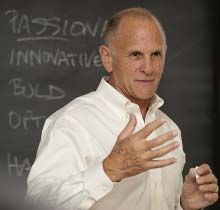Would you trust your money to somebody who is solely thinking of a serial-exit? I doubt it. I certainly would not. And, yet, “serial” and “exit” are frequently used – sometimes proudly – by so many in the venture community.
Let’s start with “serial.”
How often have you heard attendees at business gatherings introduce themselves as “serial entrepreneurs?” I have witnessed it with increasing frequency, and every time I shudder. To me, the terms serial and entrepreneur do not belong together. They violate the essence of an entrepreneur: his or her total dedication to the enterprise. You want the entrepreneur to be fully consumed by the dream, and to vest in the journey a level of emotional intensity that does not leave room for second thoughts. The real entrepreneur is in it fully. This complete emotional investment represents the key difference between just being a good leader and being a good entrepreneur. The former does not require the totality of commitment, the latter does. So, the real entrepreneur would not view his or her avocation as “serial” since there is no thought of “leaving” but only of building. Which brings me to “exit.”
A favorite question of venture capitalists is “what is your exit strategy?” Again, another non-sequitur. The entrepreneur should be ONLY thinking of growth and impact, not of when or how to get out. Of course, it is OK to talk about a liquidity strategy. That is part and parcel of the capital formation task of any venture, since most sources of capital require definition of cash-out conditions. But that has nothing to do with “exit.” Unless, of course, the investor is worried about the entrepreneur’s capability to lead as the enterprise grows. A very different – and good – problem, as it implies enough success to warrant new leadership skills that the entrepreneur may or may not have.

I like your humanistic approach to entrepreneurship and I like your post. However, to be a devil’s advocate, I wonder if there is, in fact, a “good” place for the serial entrepreneur in today’s business world. There are some people who are talented at starting, but not growing projects. People who have lots of viable ideas, and can even get them off the ground, but quickly lose interest in the day-to-day, painstaking and ongoing work it takes to build. So long as these people know themselves well enough to recognize that they need to create a situation whereby their work will be continued beyond their own capacity to sustain the venture, their contributions to business and job creation may be a good thing.